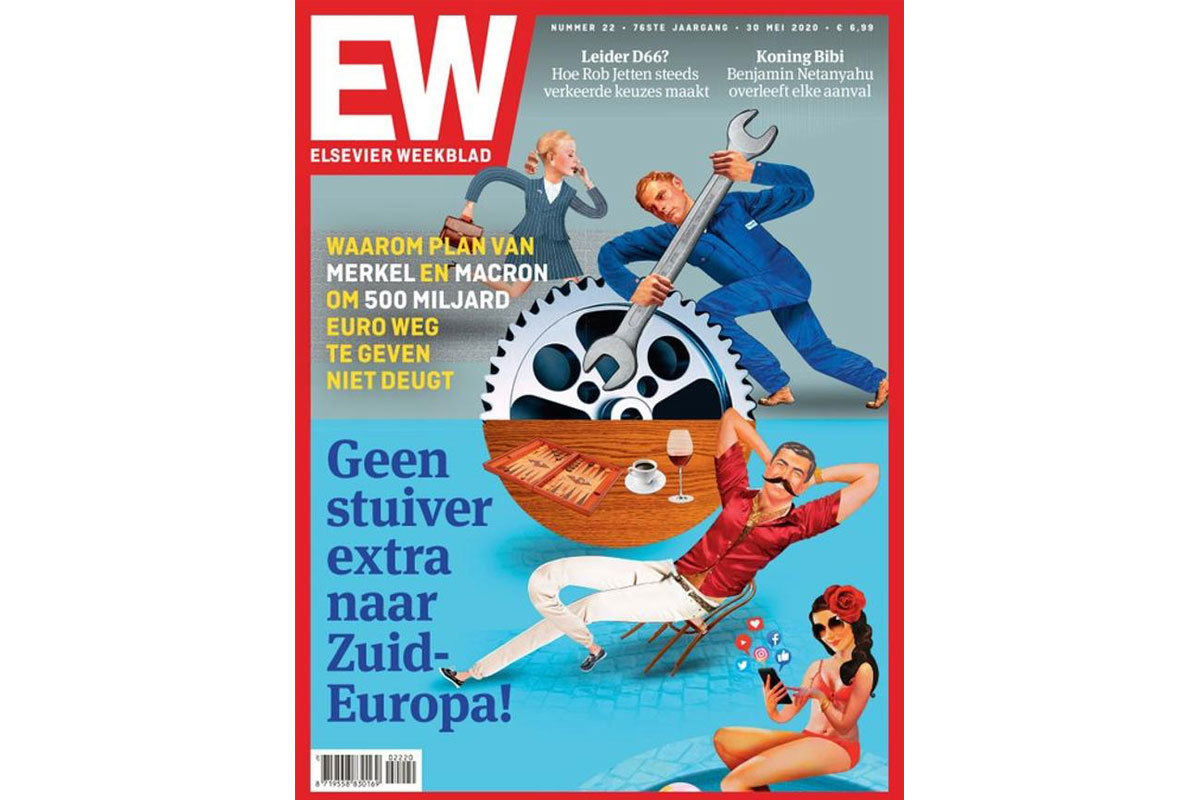- EU: Reforms and Compliance in Exchange for Funds: Brussels Conditions for Recovery
- Spain. Spain elects 11% of its GDP from the European fund: how much will each country receive?
A prestigious Dutch weekly, Elsevier Weekblad , published on Thursday a cover in which it branded "lazy" Spaniards and Italians, represented by a man with a mustache drinking wine and a woman in a bikini, while two suits with Dutch blond hair work moving the financial machinery of the European Union .
With the headline "Not a penny more in southern Europe," the magazine explains "why the plan by (German Chancellor) Merkel and (French President) Macron to give away $ 500 billion is not a good idea," adding that Some 30 billion euros will come out of the Netherlands pocket .
In his article published this Thursday, he believes that the proposal is "perverse" because it purports to be "an unconditional donation" to the countries most affected by the epidemic, which "means a transfer of money from northern to southern Europe" and regrets that Merkel is "willing to transfer cash" to countries like Spain and Italy .
"The facts show that the countries of Southern Europe are not poor and have enough money or access to money. They can also improve the purchasing power of their economies quite easily, with reforms such as those already implemented in the north," He says referring to the reforms applied in the Netherlands after the 2008 financial crisis.
He assures that "several fables must be denied" because, if "all the capital in France is added together and divided by the number of adult inhabitants, a French person has an average of 276,121 euros, an Italian would have 234,139 euros and a Dutchman 279,077 euros, and for the Germans they would drop to 216,654 euros ", data that he deduces from figures offered by the Swiss bank Credit Suisse .
According to his calculations, the Germans are, on average, poorer than the French or Italians, and the Dutch are "only slightly richer."
He also argues that the Netherlands public debt is lower than that of the rest, at 59.4%, but warns that the private debt of Dutch households is much higher, reaching 241.6%, while "Eurostat shows that Italy has a national debt of 137% and a private debt of 107% ".
No mention of the European Recovery Fund
The weekly criticizes the Franco-German proposal, although it makes no mention of the proposal presented on Wednesday by the European Commission (EC) to establish a recovery fund of 750,000 million euros, of which 500,000 million will be given in the form of subsidies and 250,000 in the form of credits.
Although he has not explicitly rejected the Commission proposal, Dutch Prime Minister Mark Rutte has pointed out that there is "time and space" to debate the final proposal in Brussels and that the negotiations "will take time".
For his part, Foreign Minister Stef Blok explained that The Hague sees "the proposals of the European Commission as a starting point for future discussions" and stressed that "the way forward must be based on solidarity and responsibility, and must strengthen the EU and its member states. "
The Dutch far-right has harshly criticized the EC's plan for a recovery fund that offers subsidies, and the populist identity Geert Wilders has accused Italy and Spain of being "bottomless pits" that "abuse the EU in every financial crisis" .
In accordance with the criteria of The Trust Project
Know more- media
- Holland
Journalism The second youth of the covers: why they continue to set the agenda in the era of digital information
JusticeA Mallorcan newspaper denounces the new Podemos website for usurping the brand
Technology Netflix returns to the highest quality in Europe but not in Spain

